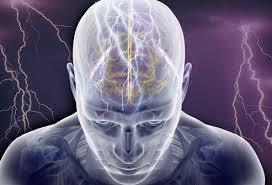epilepsy
英 [ˈep.ɪ.lep.si]
美 [ˈep.ə.lep.si]
- n. [内科] 癫痫,癫痫症
使用频率:

记忆方法
将“epilepsy”分解为“e pi le psi”。想象“e”像一个小男孩在“pi”这个大钟下跳跃(pi 像一个倒置的钟),由于他的动作(lepsi,可看作“leaps”跳跃的缩写),不小心触发了癫痫(seizure)的发作。这样的故事可以帮助你记忆这个单词的含义。
以上内容由AI生成, 仅供参考和借鉴
中文词源
epilepsy 癫痫
epi-, 在上,在中。-lepsy, 拿,握,抓住,词源同lemma, catalepsy. 即疾病上身的。
英语词源
- epilepsy
-
epilepsy: [16] Etymologically, epilepsy is the Greek equivalent of English seizure or attack. The word comes, via French or Latin, from Greek epilēpsíā, a derivative of epilambánein ‘seize upon’. This was a compound verb formed from the prefix epí- ‘on’ and lambánein ‘take hold of’.
- epilepsy (n.)
- 1570s, from Middle French epilepsie (16c.), from Late Latin epilepsia, from Greek epilepsis "epilepsy," literally "a seizure," from epilambanein "to lay hold of, seize upon, attack," especially of diseases, but also of events, armies, etc., from epi "upon" (see epi-) + lepsis "seizure," from leps-, future stem of lambanein "take hold of, grasp" (see analemma). Earlier was epilencie (late 14c.), from Middle French epilence, a variant form influenced by pestilence. The native name in English was falling sickness.
权威例句
- 1. She has epilepsy.
- 她患有癫痫。
- 2. He couldn't take that job at the zoo because of his epilepsy.
- 他因患有癫痫而无法接受动物园的那份工作.
- 3. The mechanism of post traumatic epilepsy ( PTE ) is unclear.
- 外伤后癫痫 ( posttraumatic epilepsy, PTE ) 的发病机制尚不清楚.
- 4. People with epilepsy and similar diseases can take pills to stabilize their condition.
- 癫痫病和类似疾病患者可吃药丸稳定病情.
- 5. Atonic seizures: An independent epilepsy type or epilepsy syndrome?
- 失张力发作: 一独立的癫痫类型或癫痫综合征?